-
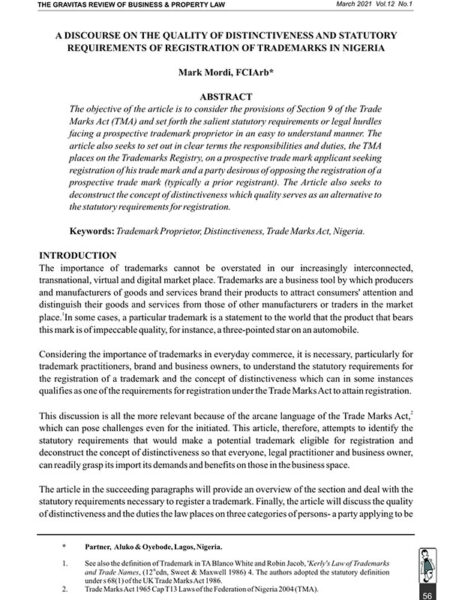
A Discourse on the Quality of Distinctiveness and Statutory Requirements of Registration of Trademarks in Nigeria
0₦2,500.00Mark Mordi, Partner Aluko & Oyebode in, A Discourse on the Quality of Distinctiveness and Statutory Requirements of Registration of Trademarks in Nigeria, deconstructs the concept of distinctiveness which quality, serves as an alternative to the statutory requirements for registration. Mordi examines the responsibilities and duties the Trade Marks Act 1965 places on the Trademarks Registry, on a prospective trademark applicant seeking registration of his trademark, and a party desirous of opposing a trademark registration (typically a prior registrant).
-
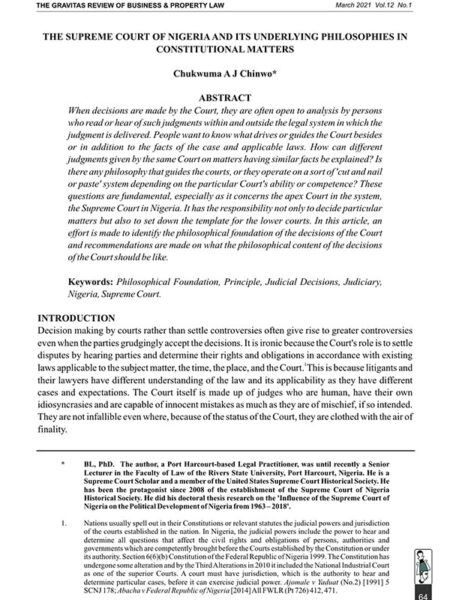
The Supreme Court of Nigeria and its Underlying Philosophies in Constitutional Matters
0₦2,500.00Dr Chukwuma Chinwo, formerly Senior Lecturer at the Rivers State University, and now a Port Harcourt-based Legal Practitioner in his article, The Supreme Court of Nigeria and its Underlying Philosophies in Constitutional Matters, asks a question that bothers many: How can the same Court give different judgments on matters having similar facts? Dr Chinwo examines the Supreme Court of Nigeria’s judicial philosophy. From an extensive review of several Supreme Court decisions, he weaves a coherent thread of factors that influence the Court’s judgments.
-
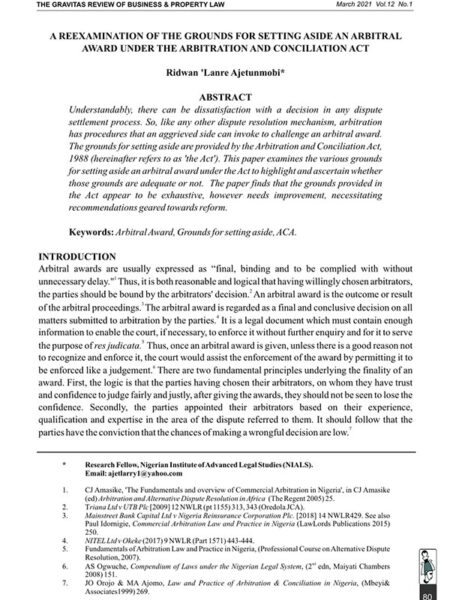
A Reexamination of the Grounds for Setting Aside an Arbitral Award Under the Arbitration and Conciliation Act
0₦2,500.00Ridwan Ajetunmobi, Research Fellow at the Nigerian Institute of Advanced Legal Studies, in his article, A Reexamination of the Grounds for Setting Aside an Arbitral Award Under the Arbitration and Conciliation Act, critically examines the various grounds for setting aside an arbitral award under the ACA. Ajetunmobi considers the adequacy of the grounds, the procedure for, and the legal effect of, setting aside an award. He proffers recommendations for further reform.
-
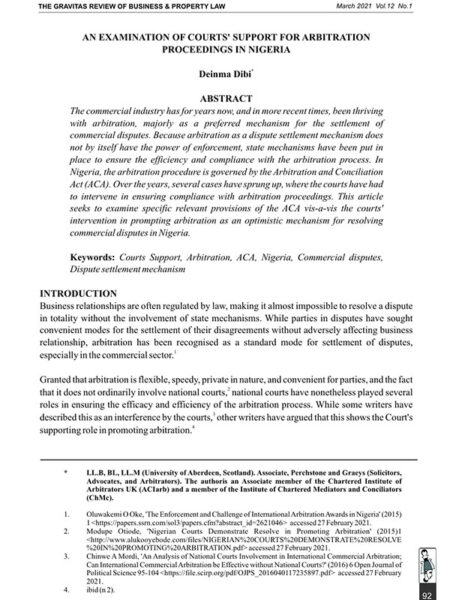
An Examination of Courts’ Support for Arbitration Proceedings in Nigeria
0₦2,500.00Deinma Dibi, Associate at Perchstone and Graeys in his article, An Examination of Courts’ Support for Arbitration Proceedings in Nigeria, examines the Arbitration and Conciliation Act, and decided cases to identify ways in which the courts in Nigeria support arbitral proceedings.
-
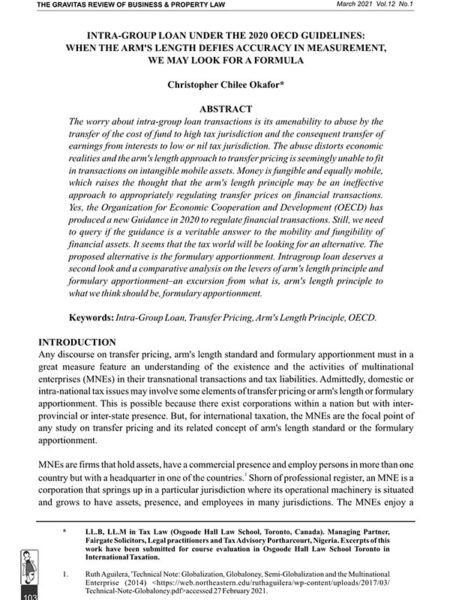
Intra-Group Loan Under the 2020 OECD Guidelines: When the Arm’s Length Defies Accuracy in Measurement, We May Look for a Formula
0₦2,500.00Christopher Okafor, Managing Partner, Fairgate Solicitors, Legal Practitioners and Tax Advisory Port Harcourt, Nigeria, in his article, Intra-Group Loan Under the 2020 OECD Guidelines: When the Arm’s Length Defies Accuracy in Measurement, We May Look for a Formula, argues that the worry about intra-group loan transactions is its amenability to abuse by the transfer of the cost of fund to high tax jurisdiction and the consequent transfer of earnings from interests to low or nil tax jurisdiction. The abuse distorts economic realities, and the arm’s length approach to transfer pricing is seemingly unable to fit in transactions on intangible mobile assets. Though the Organization for Economic Cooperation and Development (OECD) has produced a new Guidance in 2020 to regulate intra-group loan, it is moot whether the guidance is a veritable answer to the mobility and fungibility of financial assets. Christopher proposes an alternative to the arm’s length principle. In his words, intragroup loan deserves a second look and a comparative analysis on the levers of arm’s length principle and formulary apportionment–an excursion from what is, arm’s length principle to what we think should be, formulary apportionment.
-
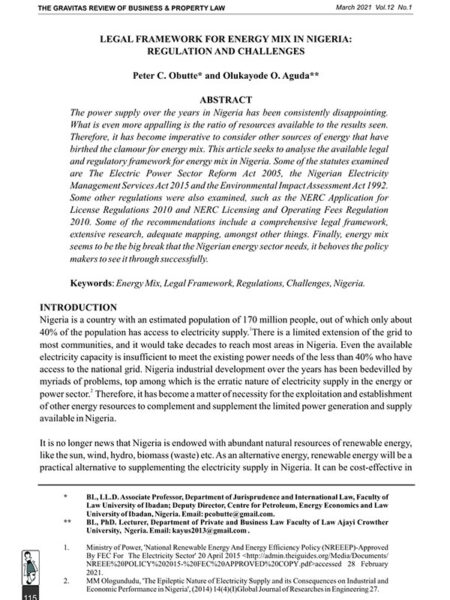
Legal Framework for Energy Mix in Nigeria: Regulation and Challenges
0₦2,500.00Dr Peter Obutte, Associate Professor, Faculty of Law, University of Ibadan and Dr Olukayode Aguda of the Faculty of Law, Ajayi Crowther University, in their article, Legal Framework for Energy Mix in Nigeria: Regulation and Challenges, note that energy mix refers to the combination of the various primary energy sources used to meet energy needs: fossil fuels (oil, natural gas and coal), nuclear energy, and renewable energy sources. Dr Obutte and Dr Aguda analyse the legal and regulatory framework for energy mix in Nigeria. They posit that energy mix seems to be the big break that the Nigerian energy sector needs, and it behooves the policymakers to see it through successfully with a comprehensive legal framework, extensive research and adequate mapping, amongst other things.
-
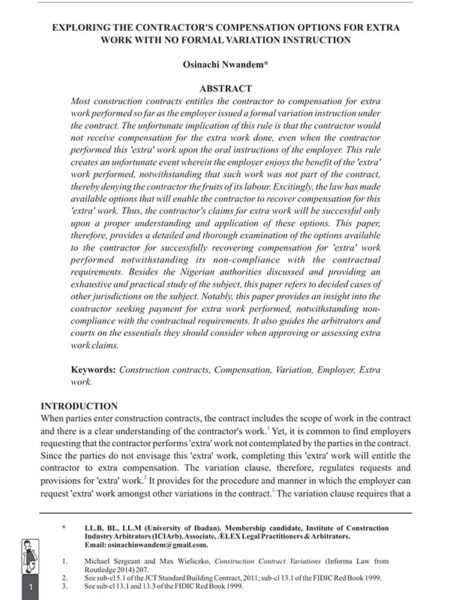
Exploring the Contractor’s Compensation Options for Extra Work with no Formal Variation Instruction
0₦2,500.00Osinachi Nwandem, an Associate at ǼLEX, in his article, Exploring the Contractor’s Compensation Options for Extra Work with no Formal Variation Instruction, notes that most construction contracts entitle the contractor to compensation for extra work performed so far as the employer issued a formal variation instruction under the contract. The unfortunate implication is that the contractor may not receive compensation for additional works done, if the contractor performed the extra work upon the oral instructions of the employer. Osinachi reviews Nigerian and foreign authorities on the issue of extra work done when there was no formal variation instruction and proffers the options available to a contractor to successfully recover compensation in such instances.
-
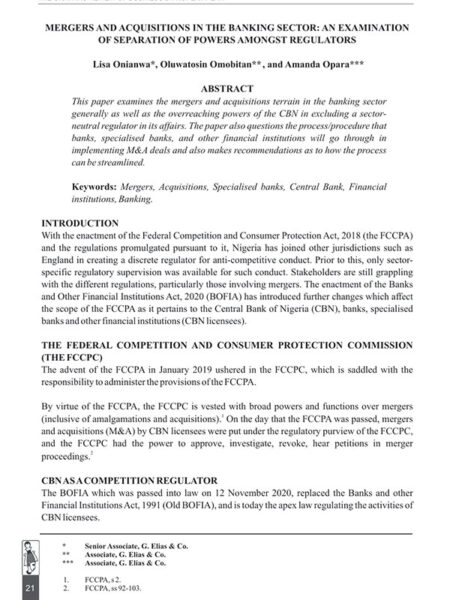
Mergers and Acquisitions in the Banking Sector: An Examination of Separation of Powers Amongst Regulators
0₦2,500.00Lisa Onianwa, Oluwatosin Omobitan, and Amanda Opara, all of G. Elias & Co, in their article, Mergers and Acquisitions in the Banking Sector: An Examination of Separation of Powers Amongst Regulators, examine the mergers and acquisitions (M&A) terrain in the banking sector and the overreaching powers of the Central Bank of Nigeria (CBN) in excluding a sector-neutral regulator in M&A deals. Onianwa et al. question the process and procedure that banks and other financial institutions implement in M&A deals and make recommendations on how the process can be streamlined.
-
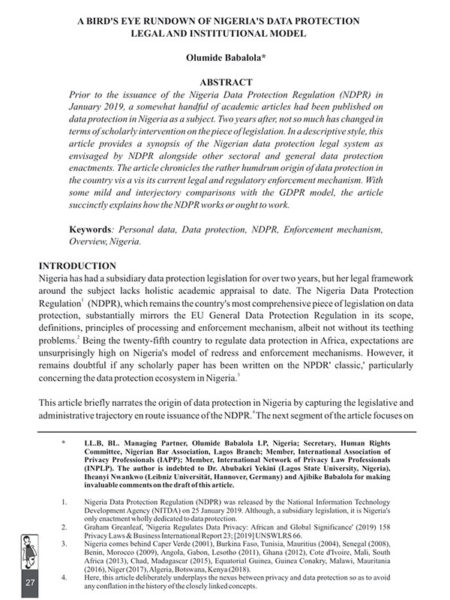
A Bird’s Eye Rundown of Nigeria’s Data Protection Legal and Institutional Model
0₦2,500.00Olumide Babalola of Olumide Babalola LP, in his article, A Bird’s Eye Rundown of Nigeria’s Data Protection Legal and Institutional Model, provides a synopsis of legislation and regulations dealing with data protection in Nigeria. He chronicles the rather humdrum origin of data protection in the country vis-a-vis its current legal and regulatory enforcement mechanism. Through comparisons with the General Data Protection Regulation (GDPR) model, Olumide explains how the Nigeria Data Protection Regulation (NDPR) works or ought to work.
-
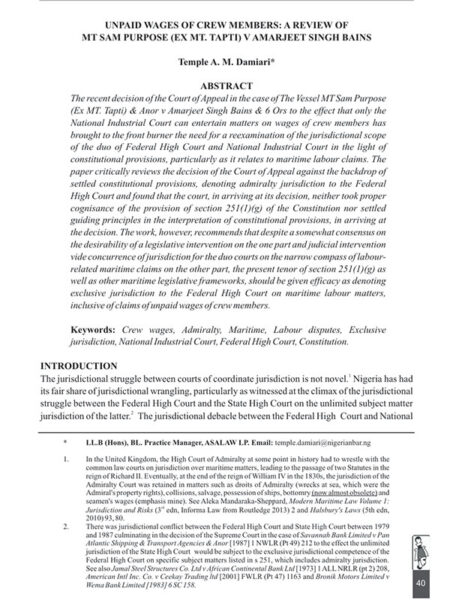
Unpaid Wages of Crew Members: A Review of Mt Sam Purpose (Ex Mt. Tapti) v Amarjeet Singh Bains
0₦2,500.00Temple Damiari of ASALAW LP continues with the exciting debate begun in the last issue of The Gravitas Review on the appropriate court with jurisdiction in wages of ship crew. In his article, Unpaid Wages of Crew Members: A Review of Mt Sam Purpose (Ex Mt. Tapti) v Amarjeet Singh Bains, Damiari critically analyses the decision of the Court of Appeal that only the National Industrial Court can entertain matters on wages of ship crew. He opines that given the settled constitutional provisions denoting admiralty jurisdiction in the Federal High Court, the Court of Appeal in arriving at its decision, neither took proper cognisance of the provision of section 251(1)(g) of the Constitution nor settled guiding principles in the interpretation of constitutional provisions.
-
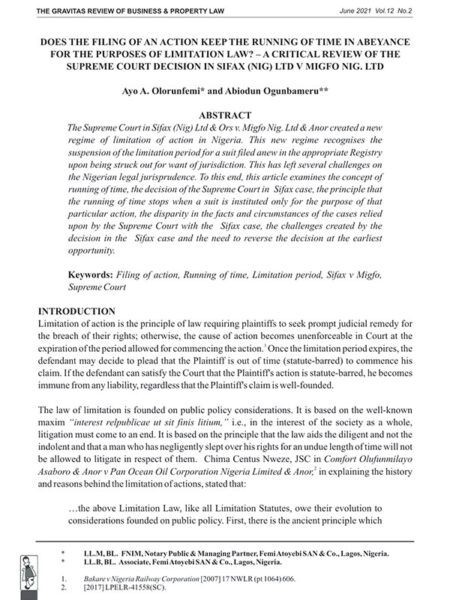
Does the Filing of an Action Keep the Running of Time in Abeyance for the Purposes of Limitation Law? – A Critical Review of the Supreme Court Decision in Sifax (Nig) Ltd v Migfo Nig. Ltd
0₦2,500.00Ayo Olorunfemi and Abiodun Ogunbameru, Managing Partner and Associate respectively at Femi Atoyebi SAN & Co in their article, Does the Filing of an Action Keep the Running of Time in Abeyance for the Purposes of Limitation Law? – A Critical Review of the Supreme Court Decision in Sifax (Nig) Ltd v Migfo Nig. Ltd, examine the new regime of limitation of action created by the Supreme Court in Sifax v Migfo and how it recognises the suspension of the limitation period for a suit filed anew in the appropriate Registry upon being struck out for want of jurisdiction. They examine the concept of the running of time, the principle that the running of time stops when a suit is instituted only for that particular action, the disparity in the facts and circumstances of the cases relied upon by the Supreme Court, and the several challenges created by the decision in the Sifax case.
-
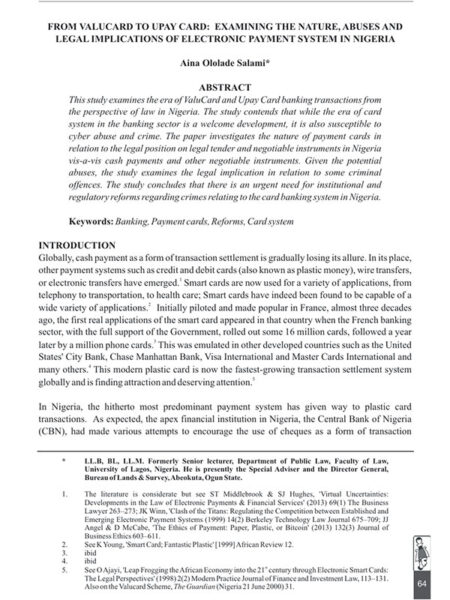
From Valucard to Upay Card: Examining the Nature, Abuses and Legal Implications of Payment Cards in Nigeria
0₦2,500.00Aina Salami, formerly Senior lecturer, Department of Public Law, University of Lagos and presently the Director-General, Bureau of Lands & Survey Ogun State, in his article, From Valucard to Upay Card: Examining the Nature, Abuses and Legal Implications of Payment Cards in Nigeria, examines the legal nature, types and abuses of payment cards in Nigeria. Given the potential abuses of card transactions, Salami explores some criminal offences relating to card transaction and advocates urgent institutional and regulatory reforms to accommodate global trends in payment systems.
The Gravitas Review of Business & Property Law



